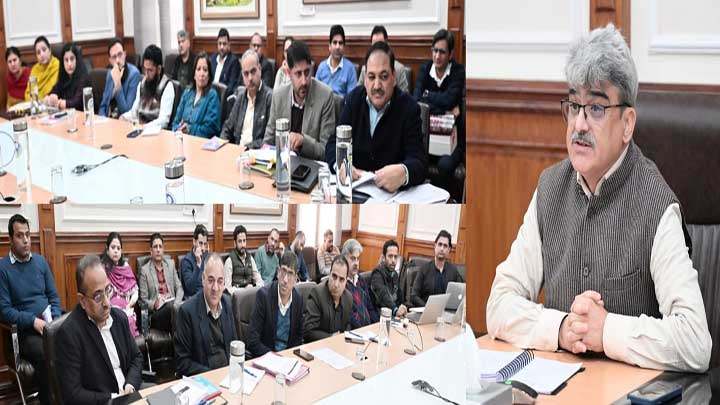Calls for enhancing quality, technology integration to improve the learning outcomes
JK News Today
JAMMU, NOVEMBER 28: Chief Secretary, Atal Dulloo, today chaired a comprehensive review meeting of the School Education Department to assess the progress and implementation of various initiatives aimed at improving teaching-learning outcomes in schools across all districts of Jammu and Kashmir.
The meeting was attended by the Secretary, School Education; Project Director, Samagra Shiksha; Director, School Education, Jammu/Kashmir, along with other senior officers of the department. The review focused on both academic and administrative reforms, technological interventions, infrastructure development and human resource management issues concerning the school education system in the UT.
During the deliberations, the Chief Secretary reviewed the status of the Five-Year Plan submitted to the Ministry of Education, Government of India, progress of Aadhaar enrolment of students, human resource management (HRM) related matters, establishment of Kendriya Vidyalayas (KVs), Jawahar Navodaya Vidyalayas (JNVs), residential schools and the progress of Atal Tinkering Labs (ATLs).
Expressing concern over the comparative enrollment trends, the Chief Secretary took note of the disparity between student enrollment in government and private schools.
He observed that despite the availability of free meals, uniforms, textbooks and other facilities in government institutions, enrollment particularly at the primary level remains relatively low. He directed the department to undertake a detailed assessment to identify gaps and devise a targeted strategy to enhance educational quality and strengthen parental confidence in government schools.
Emphasising the role of technology in transforming education, the Chief Secretary called for making existing technological interventions more focused, inclusive and student-centric. He stressed the need for enriching the Vidya Samiksha Kendra (VSK) platform with diverse and comprehensive learning materials and increasing the number of high-quality learning videos for students across all classes to ensure ease of access and effective learning.
Encouraging innovative funding approaches, the Chief Secretary urged the department to explore Corporate Social Responsibility (CSR) funding opportunities from major Central PSUs and local businesses to support educational interventions. He assured his full support in facilitating such collaborations.
He instructed the department to ensure that all students receive their prescribed textbooks in a timely manner and called for the formulation of a robust mechanism to curb the illegal charging of admission fees by private schools. He directed for the adoption of an effective enforcement strategy to address this issue across J&K.
While reviewing the progress of the Vidya Samiksha Kendra, the Chief Secretary highlighted the importance of integrating Artificial Intelligence (AI) and analytics into the education ecosystem. He provided strategic guidance to the VSK team to leverage these technologies for making learning content and digital tools more accessible, efficient and user-friendly for both students and teachers across J&K.
Addressing human resource concerns, the Chief Secretary reviewed the status of seniority lists, conduct of Departmental Promotion Committees (DPCs) and other cadre-related matters. He impressed upon the department to accord priority to resolving these issues to enable teachers to focus entirely on their primary responsibility of imparting quality education.
On the occasion, Secretary, School Education, Ram Niwas Sharma, informed the meeting that the department has formulated a comprehensive Five-Year Action Plan amounting to Rs. 1,678.91 Cr aimed at achieving saturation under various interventions. These include the establishment of ICT/CAL labs, smart classrooms, vocational labs, virtual reality labs, astrophysics labs (Aaghaaz), STEM labs and other infrastructure and academic components.
He also highlighted the introduction of pre-board examinations for Class 10th and 12th students for the first time to improve their preparedness and academic performance in board examinations. Additionally, the department plans to introduce transport facilities for students in remote and far-flung areas to mitigate dropout rates and improve attendance.
Providing key statistics, the Secretary stated that the current enrollment in government schools stands at 13,56,838 students compared to 12,60,979 in private and other institutions. He further informed that at present, 36 Kendriya Vidyalayas, 21 Jawahar Navodaya Vidyalayas, 89 Kasturba Gandhi Balika Vidyalayas (KGBVs), 06 Girls’ Hostels and 06 Eklavya Model Residential Schools are operational across J&K. Additional institutions in the pipeline include 15 KVs, 79 Girls’ Hostels and 07 Netaji Subhash Chandra Bose institutions across various districts.
He also apprised that over 6,400 Parent-Teacher Meetings (PTMs) and extensive enrollment drives have been conducted across both divisions, resulting in significant improvement in fresh admissions and enhanced parental engagement.
Regarding service matters, the Secretary assured that all seniority lists pertaining to 36 cadres would be issued by January 2026, followed by the conduct of DPCs to facilitate career progression for eligible employees of the department.
Meanwhile, Anuj Chugh from the Vidya Samiksha Kendra team briefed the Chief Secretary on the current implementation of the Ministry of Education’s 6A Framework under VSK and presented the roadmap for its future expansion and enhancement in the UT.




